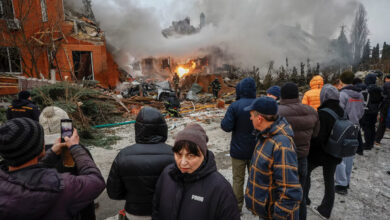
(CNN) – When Jonathan Franks first heard that the American basketball star Brittney Griner had been detained in Russia, his initial sense was one of disbelief.
The Russian Customs Service claims that Griner was ‘smuggling significant amounts of narcotic substances’ and says that a criminal case is underway. A potential jail sentence of 10 years has been mentioned.
“They’re making her out to sound like a drug kingpin. I think that it is unlikely that Ms. Griner will get a fair trial,” concludes Franks, “because nobody gets a fair trial in Russia. It’s a rigged game.”
In 2014, the American Iranian journalist Jason Rezaian was detained in Tehran. He couldn’t have known it at the time, but he was in for a long stay at Iran’s notorious Evin Prison: 544 days.
The Washington Post reporter was eventually released in January 2016, and in Griner’s case he sees many parallels to his own. “It’s the most audacious hostage taking by a state imaginable,” Rezaian told CNN.
“I know from my own case that the supposed charges against me were not based in anything like reality, and they were used to perpetuate a narrative about why I was being held.”
Like Franks, Rezaian cautions against repeating the allegations against Griner verbatim.
“I think that every time reporters repeat that narrative, we’re doing some of the dirty work of the hostage takers for them. My attitude is Brittney Griner is innocent of any crimes until the world sees otherwise,” adds Rezaian.
It’s still not exactly clear when Griner was apprehended in Russia, but it was some time in February, as she was returning from the States to compete for UMMC Ekaterinburg in the Russian basketball league.
It’s Griner’s seventh season in Russia, where she plays during the off-season in North America. News of her predicament didn’t arrive in the US until March 5, when Russia revealed that they were holding her.
Only then did Griner’s wife, Cherelle, begin writing about it on Instagram. “There are no words to express this pain,” she said. “I’m hurting, we’re hurting.”
If she can indeed be classified as a ‘hostage,’ Griner will join an unenviable club of around more than 50 American citizens who are currently held hostage or wrongfully detained overseas.
Campaigners have been working to free Americans Reed and Paul Whelan, who are both in Russia.
Whilst acknowledging that Griner’s family have been placed under an enormous amount of emotional stress, Rezaian believes they should have spoken up sooner.
“They made the same mistake that I see others making time and again, allowing the possible hostage taker to take control of the narrative,” says Rezaian.
“Unfortunately, we see people telling themselves: ‘This is all just a big mistake that’s going to blow over in a few days.’ Suppressing her detention isn’t doing her any favors, these things don’t magically resolve themselves.”
The timing of Griner’s detention could hardly be worse, she was arrested in the lead-up to Russia’s invasion of Ukraine and it was publicized only after the US had begun sanctioning the Russian government.
“You can’t extricate these things from each other,” Rezaian explained. “To try and maintain diplomatic niceties around these situations may be in the interest of US national security, but it’s certainly not in the interest of Brittney Griner.”
Rezaian urges Griner’s family to speak up and encourages her American employers to make some noise.
Griner is a two-time Olympic champion, a seven-time all-star with the Phoenix Mercury and a legend of the women’s professional league, the WNBA. Whilst her team and the league have issued brief statements, Rezaian says they could and should be doing so much more.
“The WNBA, a part of the NBA, one of the biggest and most powerful sports leagues in the whole world, has a real responsibility to this individual,” he says. “There should be a robust response.”
In the vacuum of information about Griner’s situation, some have sought to fill the airwaves with commentary about her involvement with Russian basketball and the wisdom of her decision to travel there at a time when geo-political tensions in the region resembled a powder keg.
It’s a sentiment that smacks of victim-blaming. “It’s irrelevant,” says Rezaian. “It’s not a credible argument.”
Franks is equally dismissive. “Would have, could have, should have. It’s Monday morning quarterbacking, and it’s not helpful,” he says. “They have welcomed her to that country to work. To me, that’s pretty brazen.”
Both men say that Griner had every right to continue working as a professional athlete in Russia, and the fact that a country in which she was well known and celebrated has now locked her up only makes the allegations against her more suspicious.
Rezaian recalls the countless trips he made in and out of Iran over a period of five years. “I never had any problems until I did,| he says. “Is that my fault? No, absolutely not.”
It’s hard for anybody to predict what the coming weeks and months will bring in Griner’s case, but Rezaian draws on his own experience to suggest that Griner might have to prepare for a long stay in Russia.
“It may turn out to be a marathon, not a sprint. You hope that it’s a sprint but conserve your energy in a way that that will benefit you throughout this ordeal,” he says.
In a podcast called ‘544 Days,’ that he released in October 2021, Rezaian details the anxiety, uncertainty, and monotony of his detention in Iran. He says he made the audio series partly to lay out a roadmap to the families of other citizens that may one day find themselves in a similar situation.
“I tried to find things to laugh at every day because there’s certainly a lot of absurdity in these situations,” he adds.
“That doesn’t take away from the horror and the terror of it, but the absurdity that a great American athlete is being held on unsubstantiated charges at the dawn of a cataclysmic war on the other side of the world? It is horrifying, but it’s also farcical in its own way.”
Franks knows from his time of advocating for Reed that Griner could be detained for a while.
He urges everybody that cares about her to keep her case in the public arena.
“Sports fans can play a huge role because they’re not a constituency that I think the [American] government is hearing from,” says Franks.
“You want to see Brittney Griner come home? Or Trevor Reed or Paul Whelan or any of the other 50 hostages? I would suggest calling the White House every day and telling them you want President Biden to prioritize the repatriation of wrongfully detained American citizens.”
Franks reiterates that Griner’s family should do the same. “There’s a difficult choice to make about whether to speak or not to but shine a light,” he says. “If it were my loved one, my answer would be shine a light. Every time.
“People that do wrongful detention are oddly sensitive to bad headlines.”




